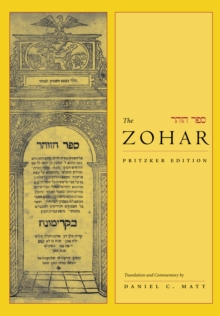
The Zohar : Pritzker Edition, Volume Seven Hardback
Part of the The Zohar: Pritzker Edition series
Hardback
Description
Sefer ha-Zohar (The Book of Radiance) has amazed readers ever since it emerged in medieval Spain over seven hundred years ago.
Written in lyrical Aramaic, this masterpiece of Kabbalah exceeds the dimensions of a normal book; it is virtually a body of mystical literature, comprising over twenty discrete sections.
The bulk of the Zohar consists of a mystical interpretation of the Torah, from Genesis through Deuteronomy. This seventh volume of The Zohar: Pritzker Edition consists of commentary on more than half the book of Leviticus.
How does the Zohar deal with a biblical text devoted largely to animal sacrifices, cereal offerings, and priestly ritual?
Here these ancient laws and procedures are spiritualized, transformed into symbols of God's inner life, now that both the Desert Tabernacle and the Temple in Jerusalem no longer exist.
For example, the ascent offering, which was totally consumed on the altar, is known in Hebrew as olah (literally, "that which ascends").
In the Zohar, this symbolizes Shekhinah, last of the ten sefirot (divine potencies), who ascends to unite with Her beloved, the blessed Holy One. The biblical narrative describes how two of Aaron's sons, Nadab and Abihu, offered alien fire before YHVH and were immediately consumed in a divine blaze.
Rabbinic tradition suggested various reasons why they were killed: they lacked the proper priestly garments, or had not washed their hands and feet, or were drunk, or were not married.
For the Zohar, marriage enables one to imitate the divine union of male and female energies, and to stimulate that union above.
By not marrying, Nadab and Abihu remained incomplete and unfulfilled.
According to a related Zoharic passage, their ritual act failed because in their contemplation of the divine qualities they did not include Shekhinah.
Without Her, God is incomplete.
Information
-
Available to Order - This title is available to order, with delivery expected within 2 weeks
- Format:Hardback
- Pages:608 pages
- Publisher:Stanford University Press
- Publication Date:14/11/2012
- Category:
- ISBN:9780804783057
Information
-
Available to Order - This title is available to order, with delivery expected within 2 weeks
- Format:Hardback
- Pages:608 pages
- Publisher:Stanford University Press
- Publication Date:14/11/2012
- Category:
- ISBN:9780804783057










